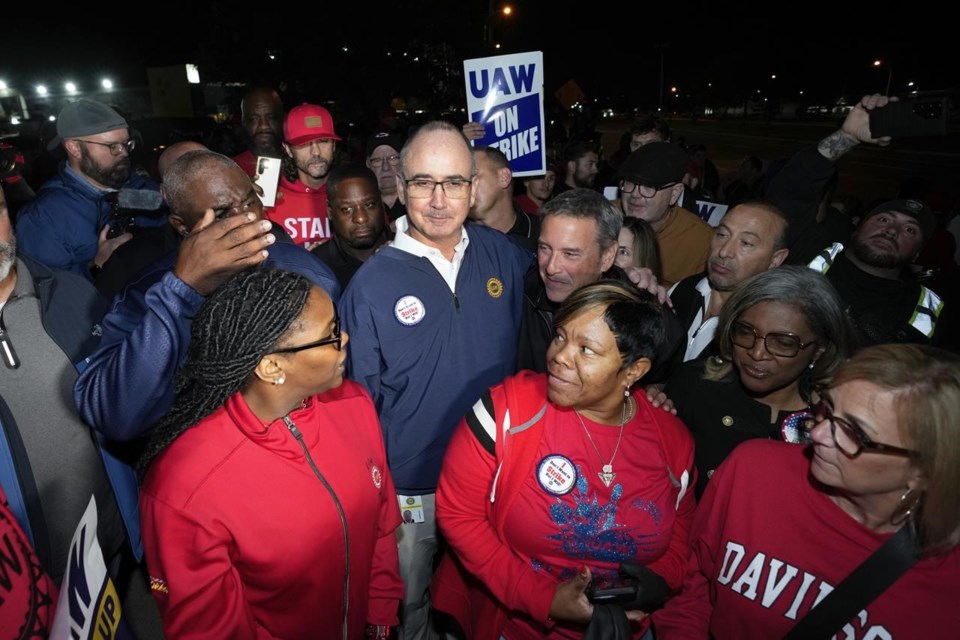TORONTO — A strike by Unifor autoworkers could still be averted as the union says contract talks with Ford Motor Co. haven't stalled, but experts say the Canadian auto sector could soon take a hit anyway after U.S. autoworkers walked off the job.
The union has met resistance in its negotiations so far, Unifor national president Lana Payne said Thursday evening in an update to members .
"To date, we have received two ... offers from Ford Motor Company and we have rejected both. That should tell you that those offers did not come close to meeting our expectations," said Payne.
However, she added that "talks have by no means stalled," and that the union has until the current contract expires at the end of the day Monday to reach a deal. After that, it could announce a strike.Â
Payne said she wouldn't make public any of the contract proposals so far, sticking with Unifor's strategy of not bargaining in public. Ford also declined to provide any update on the talks. Â
Meanwhile, some 13,000 U.S. autoworkers started striking Friday, targeting a plant at each of the Detroit Three automakers.
Members of the United Auto Workers union began picketing at a General Motors assembly plant in Wentzville, Mo., a Ford factory in Wayne, Mich., near Detroit, and a Stellantis Jeep plant in Toledo, Ohio.
It was the first time in the union’s 88-year history that it walked out on all three companies simultaneously after four-year contracts with the companies expired at 11:59 p.m. Thursday.
The strike, while limited for now, could soon have an impact on deeply integrated Canadian parts suppliers, said Automotive Parts Manufacturers' Association president Flavio Volpe.
"As of today, with these plants shut down, it's not an immediate hit, but it could be quite soon," said Volpe.Â
"If we see an expanded shutdown or a prolonged strike, it's going to have an effect for sure on volume production, on lines at Canadian parts suppliers."
He said parts suppliers could keep producing with plants down, but they can only really carry one or two days' inventory.
And while U.S. workers have already walked off the job, and their president Shawn Fain has taken a combative tone in this round of bargaining, Volpe emphasized different circumstances in Canada where the union and industry have worked closely together on issues.
"We're monitoring like we always do, but I'm certainly making no equivalence between the Unifor talks and the UAW talks," he said.Â
Sam Fiorani, vice-president of Global Vehicle Forecasting at AutoForecast Solutions LLC, said they haven't seen impacts yet on Canadian suppliers, but it will happen if the strike persists.
"It's likely that in a couple of weeks, if the strike were to hold up, it will affect a bunch of small companies on both sides of the border."
He noted that the plants the UAW chose to target don't affect any of the Detroit Three powertrain operations in Canada, leaving Unifor the chance to strike at those plants.
"With Unifor negotiating at almost the same time, it's unlikely that the UAW would target anything that would significantly impact Canadian suppliers or factories, just so that Unifor could have the unique strength to target its own plants."
So far, even the U.S. strikes are fairly limited as the UAW looks to pressure automakers into more concessions, said Fiorani.Â
"It's a minor inconvenience for the Detroit Three, and it's just to show them that they can shut down the plants if they want to."
Autoworkers do seem to have public support to press further though, said Stephanie Ross, an associate professor at McMaster Univeristy's School of Labour Studies.
She pointed to a recent poll in the U.S. that found 75 per cent supported the UAW even as it pushed for a 40-per-cent pay bump as it tries to catch up on concessions from past bargaining rounds. The situation contrasts with negotiations in decades past when automakers looked to gain public support by emphasizing outsized pay packages for workers.
"It is actually possible now for unions to feel more confident about going to the public with their demands, and being able to frame them as this is what is just, this is what we deserve, and this is also what you deserve, which is very much the tack that UAW is taking."
The aggressive stance of the UAW, and their kicking off strike action ahead of Unifor, puts the Canadian union in a tricky spot, said Ross, as workers will judge contract gains against each other.
"It strikes me that Unifor now kind of has to wait to see what happens in the U.S.," she said.
"There are risks to Unifor getting a settlement too early because what if the UAW gets a better deal on a whole host of issues?"
Payne, however, has tried to emphasize that issues faced by the two unions are not the same. In her Thursday update, she noted that there are important differences in contracts, including pay rates and job security, along with wider differences such as universal health care in Canada and more non-union competition in the U.S.Â
"All of this accounts to completely different political, social and economic context for our members, as well as differences in our collective agreements."
What both unions share though is that they're in contract talks with auto companies that have seen historic profits, and workers that are hungry for gains.
"The companies continue to rake in money hand over fist at a time when Canadian auto workers, active and retired, are facing the most difficult affordability crisis in a generation. There is a lot at stake in these talks for everyone," said Payne.
This report by The Canadian Press was first published Sept. 15, 2023.
— With files from The Associated Press
Ian Bickis, The Canadian Press




